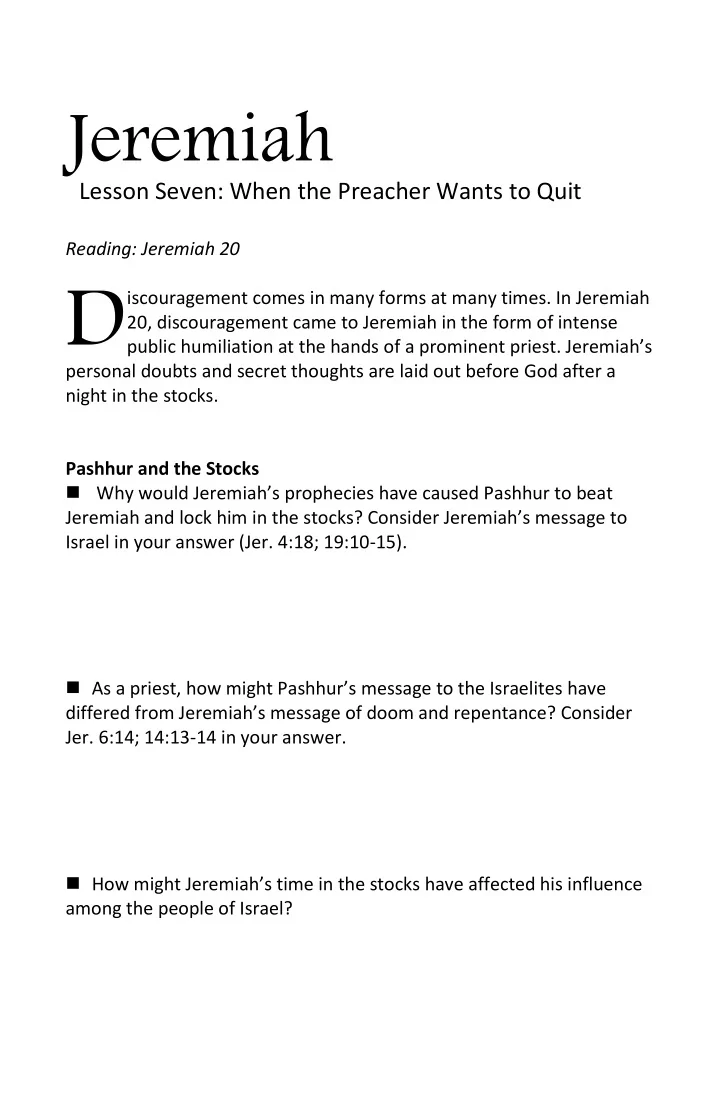

Jeremiah Lesson Seven: When the Preacher Wants to Quit Reading: Jeremiah 20 D iscouragement comes in many forms at many times. In Jeremiah 20, discouragement came to Jeremiah in the form of intense public humiliation at the hands of a prominent priest. Jeremiah’s personal doubts and secret thoughts are laid out before God after a night in the stocks. Pashhur and the Stocks Why would Jeremiah’s prophecies have caused Pashhur to beat Jeremiah and lock him in the stocks? Consider Jeremiah’s message to Israel in your answer (Jer. 4:18; 19:10-15). As a priest, how might Pashh ur’s message to the Israelites have differed from Jeremiah’s message of doom and repe ntance? Consider Jer. 6:14; 14:13-14 in your answer. How might Jeremiah’s time in the stocks have affected his influence among the people of Israel?
Jeremiah’s Release Jeremiah named Pash hur “Terror on Every Side.” How did Pashhur live up to that name? (v. 4). The Laughing-Stock Why did Jeremiah want to quit? “ This is a unique psychological passage in What do you think about Jeremiah’s canonical prophecy, prayer in vv. 7- 8? Did The Lord “deceive” a passage him? What did Jeremiah mean? Was the tremendous with prophet out of line? feeling, a soul laid bare.” -F. Cawley Should we be as frank as Jeremiah in our prayers? Other examples of bitter prayers can be found in Neh. 4:4-5; Job 9:14-17; Ps. 102:9-10; 137. What good does it do for us to complain to God? How did the Word become a “reproach and derision” for Jeremiah? Will we be mocked for speaking the truth? Why? (see John 15:18-19). The Burning Fire In what sense was the Word of God in Jeremiah’s “heart” and “shut up in his bones?” (v. 9; cf. John 8:31 -32; Ps. 119:11).
In what sense is the Word of God a “burning fire”? (cf. Ps. 39:3; Luke 24:32). Why did Je remiah’s relationship with the W ord of God make it impossible for him to keep it to himself regardless of the harm he was suffering? What is the difference between Jeremiah’s relationship to the Word and ours? Does it burn in us the way it did in him? Do we hide it in our hearts? Are we so devoted to it that it is impossible for us to keep it to ourselves? If we are as devoted as Jeremiah was to the Bible, why are so few of us preaching the gospel? The Justice of God How are verses 11-13 different from the rest of the chapter? Do these verses balance out Jeremiah’s bitterness at the beginning of the chapter and at the end? What does Jeremiah say in God’s favor? How do you know that he remains true to his Lord? Is something wrong with Jeremiah psychologically, or do you think his thought process is fairly typical human behavior? An Unhappy Ending Summarize Jeremiah’s final wish in verses 14 -18.
Are you shocked by his words? Are they appropriate? How should we respond to persecution? How does Christ change the way we react to those who mock and revile us? (Matthew 5:11 – 12; 1 Peter 2:18 – 24). Readings for Meditation “I preached as never sure to preach again, and as a dying man to dying men.” -Richard Baxter “ People have an idea that the preacher is an actor on a stage and they are the critics, blaming or praising him. What they don't know is that they are the actors on the stage; he (the preacher) is merely the prompter standing in the wings, reminding them of their lost lines.” -Soren Kierkegaard The … questions I rehearse before speaking [are] as follows: Am I worried about what people think of my message or what God thinks? (Teach with fear.) Do I genuinely love these people? (Teach with love.) Am I accurately presenting this passage? (Teach with accuracy.) Have I applied this message to my own life? (Teach with integrity.) Will this message draw attention to me or to God? (Teach with humility.) Do the people really need this message? (Teach with urgency.) -Francis Chan
Recommend
More recommend